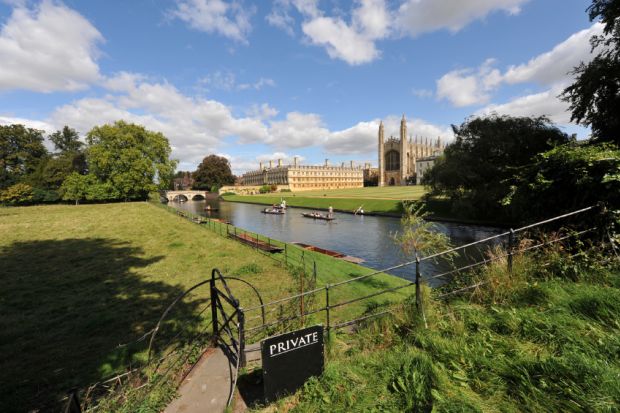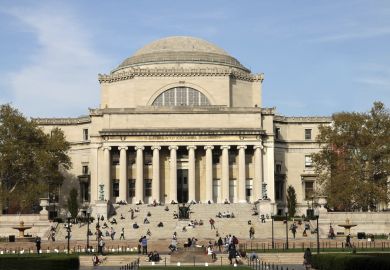“Brexit is a big shitshow,” said Michael Roth, Germany’s Europe minister, a few weeks back. He traced the “shitshow” back to a particular orifice: Britain’s (or more accurately, England’s) education system.
Roth, a Social Democrat, accused “90 per cent” of the British Cabinet of having “no idea how workers think, live, work and behave” and said it would not be those UK politicians “born with silver spoons in their mouths, who went to private schools and elite universities that will suffer the consequences of the mess”, according to Bloomberg’s report.
As Brexit unfolds, or unravels, friends on the Continent are pointing out that England’s fondness for “elite” education may be a contributing factor. But curiously, few politicians or commentators on this island are doing the same.
A week before Roth’s comments, I had spoken with a senior figure at a Dutch university who had watched with fascination the episode of the BBC’s Inside Europe documentary focusing on Brexit and the genesis of David Cameron’s decision to hold the European Union referendum – a decision driven by the prime minister’s concerns about the threat to his Conservative Party from the hard-right Eurosceptic party Ukip.
The documentary reaffirmed to him “how irresponsible Cameron and others” in the ruling Conservative leadership had been. He put this down to Britain being “a society with classes” and to the fact that, for politicians such as Cameron and Boris Johnson (who both attended Eton College and the University of Oxford) “it’s a game; because they are safe…they don’t care. They are not thinking in a responsible way about the impact for society.”
A few months before that, I had heard a continental European expert on higher education argue, at a London event, that Brexit had exposed the myth of the superior quality of Oxford and Cambridge by exposing the incompetence of the governing class they train.
And Der Spiegel journalist Jan Fleischhauer wrote of Brexit: “Almost everyone who has had a say in this adventure seems to belong to the British establishment, meaning they went to an outrageously expensive private school and completed their studies at Cambridge or Oxford. What in the name of God do they teach them?”
England’s approach to higher education must indeed look very odd from the perspective of the leading university systems on the Continent.
In Germany, universities are non-selective in admission by comparison with English counterparts (with the exception of high-demand courses). LMU Munich president Bernd Huber, who leads an institution that has 50,000 students yet is internationally respected, told me in 2016 that in Germany “it’s not so important which university you have attended…You can say very roughly if you do an undergraduate degree you will get a very good education at every university in Germany.”
Similarly in the Netherlands, I heard how completion of the post-high school diploma earns students the right to enrol at university, selection is used in admissions only to courses where demand exceeds the number of places (11 per cent of courses last year) and there is a pride in maintaining high standards across all of the nation’s universities.
In neither Germany nor the Netherlands is it necessary for senior politicians to have attended particular universities. To give a very rough impression: the last six Dutch prime ministers attended six different universities; the last four German chancellors attended four different universities.
The question of whether, and how, England’s contrasting, extreme social hierarchy of education has helped to breed its political and social discontents receives scant attention on this side of the Channel.
In analysis of the Brexit vote in the UK, being a graduate, or a non-graduate, is understood to be one of the key determining factors in support for Remain or Leave – but in a blunt way that elides the social and economic differences within both those groups.
The Labour MP Gloria De Piero has written thoughtfully about her conversations with Leave voters in her Leave-voting constituency of Ashfield in Nottinghamshire – and particularly how frustration over lack of access to education, and resentment of those with access to education, was a recurring theme. But attempts to gain such insights are rare.
The historian David Kynaston, co-author of a recent book on private schools and inequality, has suggested that the “ongoing Brexit disaster” means we now see our privately educated rulers as “a caste of privileged and entitled men (occasionally women) with necessarily only limited understanding of, and empathy with, the realities of everyday life (including state education) as lived by most people”. As yet, there’s not much evidence of this in the political debate initiated by Brexit.
In France, Emmanuel Macron has reacted to the gilets jaunes movement and the resentment over inequality it expresses by moving to abolish the École Nationale d’Administration, the civil service training institute that is the closest thing to an Oxbridge-style, socially exclusive feeder for the political elite to be found on the Continent.
There’s plenty of debate over whether Macron’s move is anything more than cosmetic – but it’s notable that he sees remedying educational inequality (or at least a visible gesture towards that) as a way to respond to anger about social inequality.
Brexit has exposed damaging social fractures in Britain. We are often told that this is an “anti-elitist” political moment, in which public trust in our political, financial and media elites is collapsing.
Will the moment come when public trust in the vertiginous educational hierarchy that produces those elites collapses as well?
John Morgan is deputy news editor at Times Higher Education.
Register to continue
Why register?
- Registration is free and only takes a moment
- Once registered, you can read 3 articles a month
- Sign up for our newsletter
Subscribe
Or subscribe for unlimited access to:
- Unlimited access to news, views, insights & reviews
- Digital editions
- Digital access to THE’s university and college rankings analysis
Already registered or a current subscriber? Login







